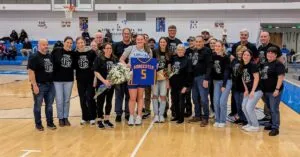Sharing Your Power & Knowing Yourself with Demitrius Evans
Resident Hall Director Demitruis Evans comes to us from Chicago, Illinois, where she recalls growing up in a working class black and brown community and finding passion in her education.
“A lot of what I learned about myself happened when I was coming of age as a senior in high school. Those moments were the spark that started me investigating to learn more about justice, healing, and self accountability”.
From Chicago, Demitrius then made her way to college, completing her undergraduate work at University of Wisconsin, Eau Claire and her Master of Science in College Student Personnel at Southern Illinois University, Carbondale Campus. Demitrius made her way to the east coast in her first professional role at Clark University, minutes from the Worcester State campus. There she served in a dual role as Resident Director and Multicultural Engagement Coordinator, acting as a liaison between residential life and multicultural affairs. A year and a half later, she brought her experience and passion to Worcester State University and her role as a Resident Hall Director.
Lessons in Leadership
Reflecting on her leadership journey, Demitrus recalls when she realized the harm that comes with the feel of needing control over what others can do. This understanding lead to a new focus on becoming an agent for change while promoting self authorship and accountability.

“I have started to let go of the very unnecessary and harmful control that, as professionals, we have learned to cultivate over students and student groups. Since I’ve gotten here, I have changed my sense of control and my sense of how I see students as being advocates for themselves, understanding their needs, and how I, as an agent of this institution, how I am able to better advocate for their needs through my sphere of influence and what I can affect.”
Demitirus recalls taking note of a previous supervisor who said it’s important to relinquish control and share the power with your students. She explains its important to take heed of what your students are asking for and what’s in your power to facilitate those requests.
“You aren’t taking over, exerting control over, or having power over. It’s having power with and empowering students to make better decisions about their wellbeing and how they own a space or idea and see it through. If you aren’t sharing information, that’s a form of power; you are disenfranchising others and not setting them up for the success they deserve.”
She defines power as knowledge, resources, (social) capital, and institutional knowledge and history. This notion of sharing power has influenced one of the things she values most as a leader: transparent and explicit communication.
“As a leader, I believe it is important to be as transparent as I possibly can. Taking information and discussing with students, ‘What does this mean for us’ and ‘what does it mean for you’ and being real about that. Letting them discuss and come to conclusions is so important in being a leader. I feel like it empowers students to make decisions on transparent information we provide to them.”
These values give her the ability to connect with her staff of Resident Assistants. She states that her biggest accomplishment at WSU has been supporting her RA staff, specifically the students of color on her team.
“I am trying to figure how I, in my position, can be a full collaborator and partner with students rather than being a parental figure. These are young adults, who can tell you fully what they want. We just have to believe them when they do.”
Knowing Yourself as a Leader
Demitrius openly and proudly identifies as someone who comes from a working class/working poor background and a black and brown community. She also identifies as black, queer, disabled and, plus sized.
“How I have come to accept these identities has often gone hand in hand, as I’ve learned more as a leader; my identity has impacted my leadership style. The reason I love transparent and explicit communication is because two years ago I was diagnosed with ADHD and depression. [Through] treatment with my therapist, I now have a support system to help me recognize how my identities and disability plays into how I lead or how I interact with the people I am building working relationships with.”

She describes that ADHD can present challenges to her executive functioning, and if she is not participating in self care and coping strategies it can impact her ability to be an effective leader.
“My functioning can be out of whack If I am not taking care of myself, getting regular sleep, engaging in coping mechanisms and adhering to activities that center focus. I like to be self aware how these things can negatively impact or harm the team.”
Demitrus emphasizes the importance of using resources provided to you to know yourself better as you go through your leadership journey. Therapy and self reflection are the core pieces of advice she offers to emerging leaders.
“Therapy [is key] because you learn to know yourself with a processing partner… to understand yourself more, how you react and ensuring you can navigate situations in a way that’s productive to your intentions. You should understand yourself. Recognize we are taking in the toxicity in our world and it plays into everyday things. If you aren’t taking advantage of therapy or Counseling Services, you need to. It’s important for how you develop as a leader, and a person who will care for others as a leader.”
Community Work and Goals
Last March, Demitrius presented at the first ever Leadership Symposium. She left an impact on her students following her workshop, where she discussed her work with Worcester Pride. Worcester Pride was an LGBTQ+ organization centered around bringing events and community to worcester. Unfortunately, Worcester Pride has dissolved, but Demitrius is happy to share that the “Worcester Pride remix is under construction.”
Her involvement in Worcester Pride was largely focused on Shades, which was a sub-committee of the organization and provided a space for queer people of color. Shades is working to restructure their organization to focus more on political engagement and social action. Demitrius further discusses how recently coming out brought her to wanting to learn more about her community and lead to her action.
“We are focussing more on how politics here in Worcester effect queer and trans people of color within the Worcester community. I looked for people, communities, and found people I can connect with and people I can learn from.”
Demitrius looks to bring this experience into her role in Residence Life. She discussed her goal to bring social consciousness and action to Worcester State.
“I would like to integrate more of my experience with justice, workshop facilitation, and development to collaborate more with the professionals [and students] around me, to spread the message of justice, love, and challenging authority, and ways that help you advocate for yourself. That’s what I really value and that is what I’m trying to be a bit more involved in.”
Written by Linzy Martinez, Assistant Director, Office of Student Involvement & Leadership Development



